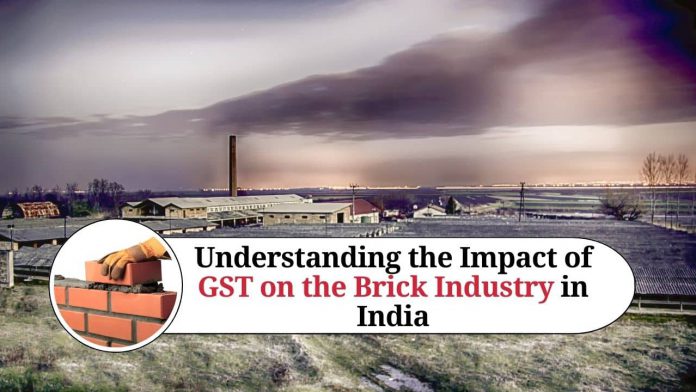Introduction
The Goods and Services Tax (GST) is a comprehensive indirect tax that is levied on the supply of goods and services in India. The GST has replaced several indirect taxes such as excise duty, VAT, and service tax, and it is aimed at simplifying the tax system and promoting ease of doing business. The GST rates for different goods and services vary depending on the type of product and the industry it belongs to. In this blog, we will discuss the GST rate for bricks, one of the most essential construction materials in India.
GST Rate for Bricks
The GST rate for bricks depends on the type of brick and its classification. In general, bricks fall under the 5% GST tax bracket. However, there are certain exceptions and variations depending on the nature of the brick.
For instance, bricks used for construction purposes, including fly ash bricks, clay bricks, and building bricks, attract a GST rate of 5%. On the other hand, refractory bricks, which are used in the construction of furnaces, kilns, and other high-temperature applications, are taxed at a higher GST rate of 18%. The GST rate for bricks is determined by the government and is subject to change from time to time.
Impact of GST on the Brick Industry
The introduction of GST has had a significant impact on the brick industry in India. Prior to GST, the industry was plagued by several indirect taxes, including excise duty, VAT, and other state-specific taxes. This resulted in an increase in the cost of production and a decrease in profit margins for brick manufacturers.
However, with the implementation of GST, the tax system has been simplified, and the compliance burden has reduced significantly. Brick manufacturers now have to pay a single GST rate instead of multiple taxes, resulting in cost savings and increased profits. Moreover, the input tax credit mechanism under GST allows manufacturers to claim a credit for the tax paid on their purchases, which further reduces the cost of production.
Impact of GST on the Construction Industry
The construction industry is one of the major contributors to India’s GDP, and the introduction of GST has had a significant impact on this industry as well. With the GST regime, the construction industry has seen a reduction in the overall tax burden, as well as a simplified tax system that has led to increased compliance and transparency. The GST has eliminated the cascading effect of taxes, which has led to cost savings for construction companies.
Moreover, under the GST regime, input tax credit is available for all goods and services used in construction, including bricks. This has resulted in significant cost savings for construction companies, which has positively impacted the growth of the industry. The reduction in the overall tax burden and increased compliance has also made it easier for smaller construction companies to enter the market, leading to increased competition and innovation.
Challenges in GST Implementation for the Brick Industry
While the introduction of GST has been a positive step for the brick industry, there have been challenges in its implementation. One of the challenges faced by brick manufacturers is the lack of awareness about the GST system, resulting in non-compliance and penalties. Moreover, the introduction of GST has led to an increase in the cost of production for some manufacturers due to the requirement for additional compliance procedures, such as registration and filing returns.
Another challenge faced by the brick industry is the lack of clarity on the classification of bricks under GST. This has led to confusion among manufacturers and has made it difficult for them to determine the correct GST rate for their products.
Steps to Ensure GST Compliance in the Brick Industry
In order to ensure GST compliance in the brick industry, manufacturers must take certain steps to ensure that they are adhering to the GST rules and regulations. These include:
- Obtaining GST Registration: All brick manufacturers must obtain GST registration in order to be compliant with the GST regulations. The registration process is simple and can be completed online.
- Proper Documentation: Proper documentation is crucial for GST compliance. All invoices, bills, and other documents must contain accurate information and be maintained properly.
- Filing of Returns: Brick manufacturers must file their GST returns on time to ensure compliance. They should ensure that all returns are filed accurately and on time to avoid any penalties.
- Correct Classification of Products: As mentioned earlier, the classification of bricks under GST can be a challenge. Manufacturers must ensure that their products are correctly classified under the appropriate HSN code to determine the correct GST rate.
- Availing Input Tax Credit: Brick manufacturers must avail input tax credit for all goods and services used in production. This helps to reduce the cost of production and increase profitability.
Conclusion
In conclusion, GST has simplified the tax system and reduced the overall tax burden for the brick industry in India. However, manufacturers must take steps to ensure compliance with the GST regulations to avoid penalties and other issues. By obtaining GST registration, maintaining proper documentation, filing returns on time, correctly classifying their products, and availing input tax credit, manufacturers can ensure GST compliance and drive the growth of their business. With proper compliance measures in place, the brick industry in India can continue to grow and contribute to the overall growth of the construction industry.
Read more useful content:
Frequently Asked Questions (FAQs)
Q1.) What is GST, and how does it impact the brick industry?
GST stands for Goods and Services Tax, and it is a tax reform that has replaced multiple indirect taxes in India. GST has a significant impact on the brick industry as it has simplified the tax system and reduced the overall tax burden for brick manufacturers.
Q2.) What is the GST rate for bricks in India?
The GST rate for bricks in India is 12%.
Q3.) Do brick manufacturers need to register for GST?
Yes, all brick manufacturers must register for GST to be compliant with the GST regulations.
Q4.) Can brick manufacturers avail input tax credit under GST?
Yes, brick manufacturers can avail input tax credit for all goods and services used in production, which helps to reduce the cost of production and increase profitability.
Q5.) Are there any challenges in implementing GST in the brick industry?
Yes, there are challenges in implementing GST in the brick industry, such as the lack of awareness and clarity on the classification of bricks under GST.
Q6.) How can brick manufacturers ensure GST compliance?
Brick manufacturers can ensure GST compliance by obtaining GST registration, maintaining proper documentation, filing returns on time, correctly classifying their products, and availing input tax credit.
Q7.) What are the benefits of GST for the brick industry?
The benefits of GST for the brick industry include a reduction in the overall tax burden, simplified tax system, availability of input tax credit, and increased compliance and transparency.
Q8.) How has GST impacted the growth of the brick industry?
GST has positively impacted the growth of the brick industry by reducing the cost of production, increasing profits, and boosting overall growth.
Q9.) Can brick manufacturers claim GST refund?
Yes, brick manufacturers can claim GST refund if they have paid excess tax.
Q10.) How can brick manufacturers resolve GST-related issues?
Brick manufacturers can resolve GST-related issues by contacting the GST department or seeking the help of a GST consultant.




















